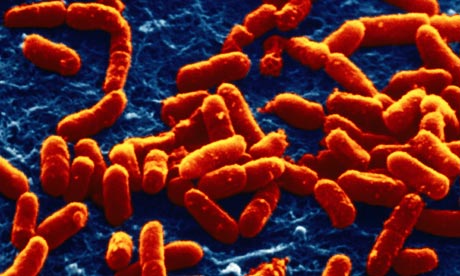
Credit: Getty/The Guardian
Bacteria are everywhere. Not just the obvious places, like a piece of rotting fruit, or in soil, but on the window, the floor, your skin, inside your mouth, your digestive tract …
Bacteria are many times smaller than cells of the human body. Because of this, the 2 to 6 pounds (0.9 to 2.7 kilograms) of bacteria in the average human body1 outnumber human cells by around 10 to 1.2
So, with all these bacteria in our bodies, why aren’t we all ill? It turns out that many of these bacteria are harmless, & some of them actually have positive effects on our health. E.g. some bacteria in the large intestine convert vitamin K1 into vitamin K2.3
There is mounting evidence, that, in addition to affecting our physical health, some digestive-tract bacteria can influence mood & mental health.
http://www.theatlantic.com/health/archive/2015/06/gut-bacteria-on-the-brain/395918/
https://theconversation.com/gut-feeling-how-bacteria-can-mess-with-your-mood-17080
http://www.businessinsider.com.au/how-gut-bacteria-affect-the-brain-2015-7
__________
1 “NIH Human Microbiome Project defines normal bacterial makeup of the body”, https://www.nih.gov/news-events/news-releases/nih-human-microbiome-project-defines-normal-bacterial-makeup-body
2 “Human microbiota”, https://en.wikipedia.org/wiki/Human_microbiota
3 “Vitamin K”, https://en.wikipedia.org/wiki/Vitamin_K / gut bacteria changes brain function gut bacteria person’s health microbes influence digestion allergies metabolism diet optimum bacterial health microbes human brain researchers investigating microbiome bacterial ecosystem regulates how people think feel scientists found evidence thousand different species bacteria trillions of cells weigh between one and three pounds crucial role autism anxiety depression disorders connections between microbiome brain Emeran Mayer gastroenterologist University of California Los Angeles UCLA studying most intriguing work autism doctors parents researchers three-quarters of people with autism also have gastrointestinal abnormality digestive issues food allergies gluten sensitivity recognition scientists examine potential connections gut microbes autism several recent studies found autistic people microbiome differs significantly control groups California Institute of Technology microbiologist Sarkis Mazmanian focused common species Bacteroides fragilis smaller quantities some children autism paper published journal Cell Mazmanian colleagues fed B. fragilis humans mice symptoms similar to autism treatment altered makeup of the animals microbiome importantly improved behavior became less anxious communicated more other mice showed less repetitive behavior how microbes interact illness trigger shield mystery Mazmanian colleagues identified possible link chemical called 4-ethylphenylsulphate 4EPS produced gut bacteria mice symptoms autism blood levels 4EPS more than 40 times higher than other mice link between 4EPS levels brain isn’t clear animals injected compound developed autism-like symptoms reverse these ailments produces this compound symptoms disappear Mazmanian awarded MacArthur grant microbiome work potential breakthrough understanding how microbes contribute to autism neurodevelopmental disorders results adjusting gut bacteria viable treatment for the disease patients reverse ailments compound symptoms disappear mouse model scientists gathered evidence gut bacteria influence anxiety depression Stephen Collins gastroenterology researcher McMaster University Hamilton Ontario strains two bacteria lactobacillus bifidobacterium reduce anxiety-like behavior mice scientists anxiety mouse feeling humans carry strains bacteria guts study colleague collected gut bacteria strain of mice anxious behavior transplanted microbes another strain calm result tranquil animals become anxious microbes major players gut-brain axis John Cryan neuroscientist University College Cork Ireland examined effects depression in animals paper published Neuroscience bifidobacterium antidepressant Lexapro stressful situations test measured microbe drug both effective increasing animals perseverance reducing levels of hormones stress experiment lactobacillus similar results Cryan launching a study with humans measurements test gauge subjects’ response microbiome-based brain research mice studies involving humans Collins transferred gut bacteria anxious humans germ-free mice guts contained no bacteria after the transplant animals behaved more anxiously research has examined entire humans bugs paper published Psychopharmacology Oxford University neurobiologist Phil Burnet prebiotic group of carbohydrates provide sustenance for gut bacteria affected stress levels among group healthy volunteers subjects powdered carbohydrate galactooligosaccharide GOS placebo previous studies mice scientists carb fostered growth Lactobacillus Bifidobacteria mice microbes increased levels of several neurotransmitters affect anxiety brain-derived neurotrophic factor experiment subjects ingested GOS showed lower levels key stress hormone cortisol test words flashed quickly on a screen GOS group focused positive information negative test measure levels of anxiety depression conditions anxious depressed patients focus inordinately threatening negative stimuli Burnet colleagues results similar subjects take anti-depressants anti-anxiety medications human study Mayer UCLA researcher recruited 25 subjects healthy women cup of commercially available yogurt twice a day yogurt probiotic contains live bacteria strains four species bifidobacterium streptococcus lactococcus lactobacillus study subjects brain scans gauge response images facial expressions happiness sadness anger eating yogurt twice a day do something to your brain journal Gastroenterology yogurt eaters reacted more calmly images control group brain bacteria yogurt subjects’ gut microbes production of compounds modified brain chemistry microbiome alters the brain researchers microbes influence brain multiple mechanisms scientists gut bacteria produce neurotransmitters serotonin dopamine GABA play key role mood antidepressants increase levels compounds organisms people metabolize compounds regulating circulates blood brain gut bacteria neuroactive chemicals butyrate reduced anxiety depression Cryan microbes activate the vagus nerve gut brain microbiome immune system influences mood behavior interconnection bugs brain evolutionary perspective bacteria lived inside humans millions of years Cryan microbes developed shape hosts’ behavior for their own ends modifying mood microbial survival strategy happy people more social more social more chances microbes exchange spread scientists gut-brain microbial network hacked treat psychiatric disorders bacteria used Prozac Valium microbes eons experience modifying our brains pharmacological approaches fewer side effects microbes treat these disorders modulate brain function /